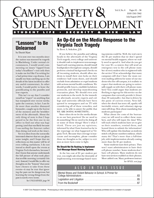Legislation and Litigation
Author: Ken Kozlowski, J.D..
Source: Volume 17, Number 02, Winter 2016 , pp.31-34(4)

< previous article |next article > |return to table of contents
Abstract:
When police learned of reports that a student was selling marijuana from his room in a fraternity house, officers went to the house to perform a “knock and talk” investigation. The detectives did not have a warrant to search the house but entered the hallway through the back entrance, assuming they could do so because a fraternity was essentially a public space much like an apartment building. A federal circuit court decided otherwise, and invalidated the drug arrest that was the subject of an appeal in Milam v. Commonwealth. This article examines the facts and reasoning in an opinion that has implications for campus and community police alike. Also reviewed are cases in which an appellate court rule that a university disciplinary board has wide latitude to adjudicate hazing charges; and an unusual case in which a student enrolled in an online course found numerous errors in the course materials and test bansk, brought the errors to the attention of faculty, was ignored, receied unsatisfactory grades, and sued the college for discrimination—on the basis of race. Cases reviewed include Milam v. Commonwealth; Reardon v. Wroan; State v. Miller; Monnat v. State University of New York at Canton; Smith v. Utah Valley University.Keywords: Expectation of privacy; fraternity houses and police searches; online courses, grading, and appeals; hazing
Affiliations:
1: Supreme Court of Ohio Law Library.